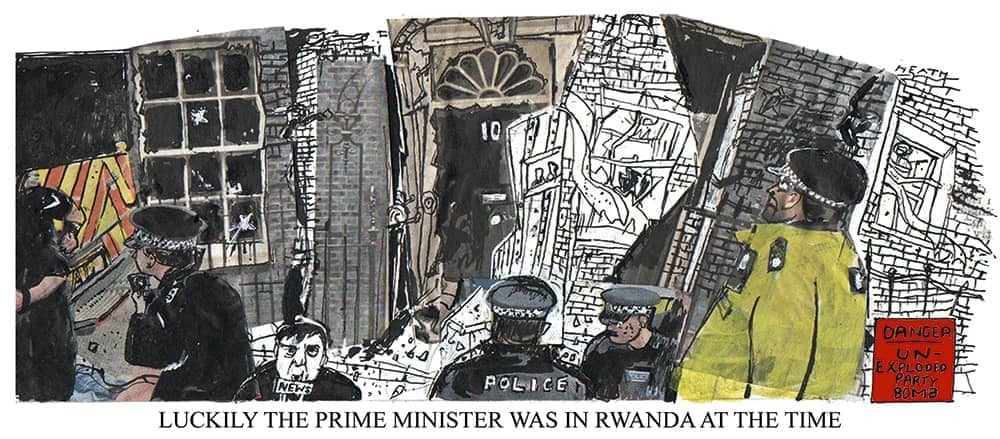Home
Boris Johnson, the Prime Minister, told the House of Commons that it did not occur to him that the gathering in the Cabinet Room on his birthday (for which he had been issued a fixed-penalty notice) could amount to a breach of the rules on coronavirus. ‘That was my mistake and I apologise for it unreservedly,’ he said. He packed his bags for a visit to India to coincide with a Commons debate on whether he had misled parliament. Priti Patel issued a ministerial direction (the second in the Home Office in 30 years) to implement a scheme whereby people deemed to have entered Britain unlawfully since 1 January could be flown to Rwanda, where they would be allowed to apply for the right to settle there. More than 6,000 people had crossed the Channel in small craft in 2022.
In the seven days up to 17 April, 1,289 people had died with coronavirus, bringing total deaths (within 28 days of testing positive) to 171,396. In the previous week 1,613 had died. Numbers with Covid remaining in hospital in the United Kingdom fell from about 20,000 to about 19,000. The NHS said that patients in waiting rooms would no longer have to observe social distancing. Jacob Rees-Mogg, the Cabinet Office minister, said that civil servants must stop working from home and return to the office. Sir Harrison Birtwistle, the composer, died aged 87.
Extinction Rebellion blocked four London bridges. A replacement for the 118-year-old railway bridge over Rugby Road, Leamington Spa, was brought through Warwickshire on a 96-wheel road transporter. Rob Key, the former England batsman, was appointed as managing director of the England cricket team and will help find Joe Root’s replacement as captain.
Abroad
Russia struck cities across Ukraine from the air, hitting Kyiv, Lviv in the west, and Kharkiv in the east. A Russian offensive engaged Ukrainian positions along a 300-mile front. Ukrainian forces in Mariupol refused an invitation to surrender; they made a stand at the Azovstal steelworks, where hundreds of civilians were reported to have taken refuge. The 100,000 civilians left in the ruined city were forbidden by Russia from moving about. Vadym Boychenko, the mayor of Mariupol, said there had been reports of Russian mobile cremation units burning civilians’ bodies to conceal war crimes. Thousands of civilians from Mariupol were reported to have been deported to Russia.
Russia’s new offensives followed a statement by Igor Konashenkov, a Russian defence ministry spokesman: ‘Missile strikes against objects in Kyiv will increase in response to the commission of any attacks of a terrorist nature or sabotage on Russian territory.’ His words followed the sinking of the 12,490ton guided-missile cruiser Moskva, the Russian Black Sea flagship. Ukraine said two of its Neptune missiles had sunk it, which American officials thought true; Russia said there had been a fire after ammunition exploded. What happened to the 510 crew members was not clear. Ukrainian police said that 900 civilian bodies had been found from the Russian occupation around Kyiv. The UN reported that five million Ukrainians had fled the country. President Volodymyr Zelensky of Ukraine accused Germany and other countries buying Russian oil and gas of dealing in ‘other people’s blood’. President Vladimir Putin said on television: ‘Unfriendly countries concede that they won’t be able to make do without Russian energy resources.’ The USA and Britain said that they would send more artillery, the Czech Republic offered to mend Ukrainian tanks, and Germany lent money to buy arms from German manufacturers.
The total in the world reported to have died with coronavirus reached 6,221,969 by the beginning of the week. In Shanghai, entering its fourth week of lockdown, three people were acknowledged to have died from Covid; officials said only 38 per cent of residents over 60 are fully vaccinated. At least 440 people died in floods in the KwaZulu-Natal province of South Africa. More than 150 Palestinians were injured in clashes with Israeli police around al-Aqsa mosque. Twenty or so police cars were set on fire in Sweden in protest against a plan by a right-wing party, Stram Kurs (‘Hard Line’), to burn a copy of the Quran. The number of Netflix subscribers fell for the first time since 2011. The board of Twitter resisted a hostile takeover bid of $43 billion from Elon Musk. Sri Lanka was defaulting on its debts, according to Fitch and S&P, and thousands protested in the street at shortages of petrol and food. CSH






Comments